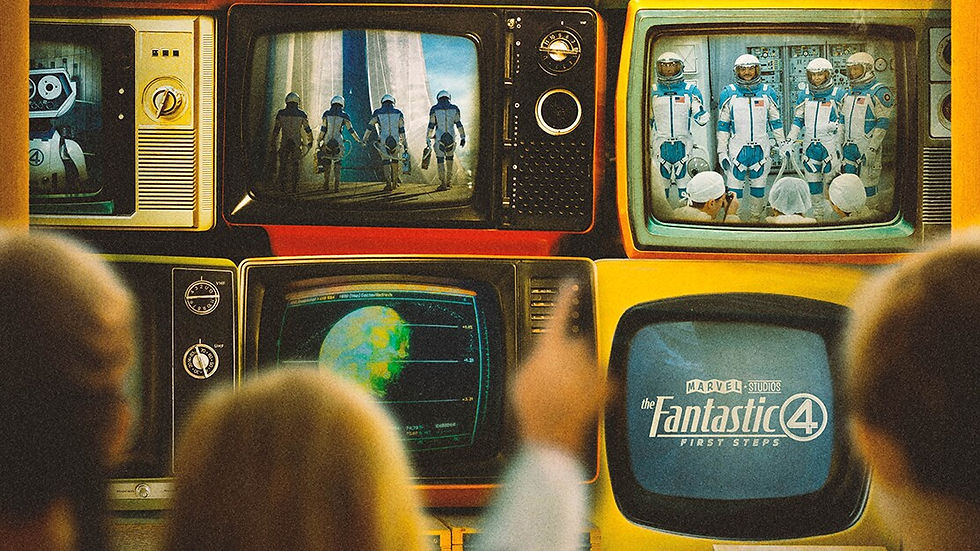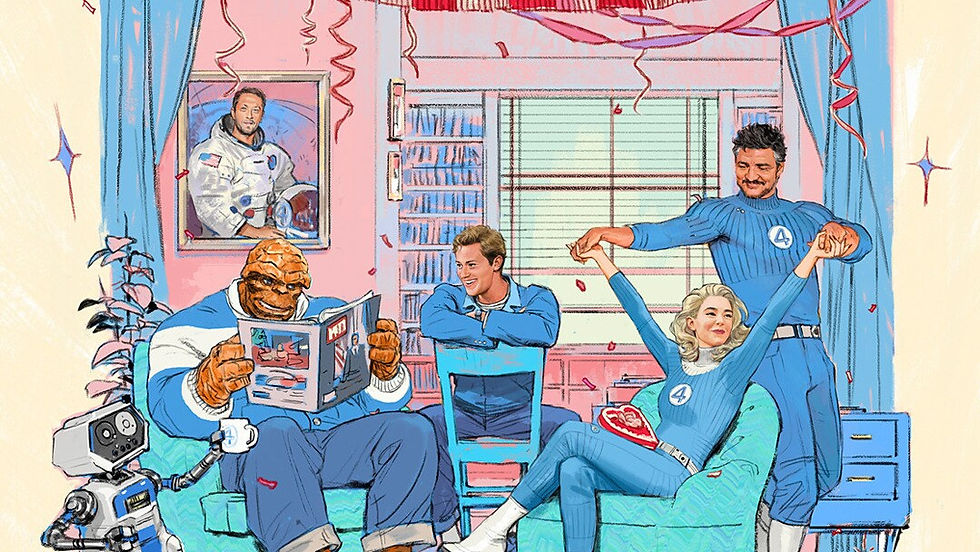The Fantastic Four: First Steps (2025) Review - Fourth Times the Charm
- Will Knowles
- Jul 24, 2025
- 5 min read
Updated: Jul 25, 2025
And like that, we've reached the end of 2025's mainstream superhero outings and as far as major years for the superhero genre go this will certainly go down as a year that had superhero films.
I obviously exaggerate. It's certainly been an improvement from previous years with 2025 having what in my eyes has been the most consistency across releases since perhaps 2019. Superman (2025) provided an exciting first chapter into the new DCU (if only I had outlined my praise somewhere, wink wink) and on Marvel's side this has been the first year in a while that I've watched all of their output on release. Captain America: Brave New World (2025) may not have given Anthony Mackie's Sam Wilson the theatrical debut he deserved but Thunderbolts* (2025) was the first MCU project I earnestly enjoyed for its own merits since Guardians of the Galaxy Vol. 3 (2023) amidst Marvel's very, very rough patch.
As this brief context illuminates, in a post-Endgame Marvel, I have fallen out of love with the MCU's multiverse lore; give me a more singular character focused flick over whatever mess the Kang/Doctor Doom arc has been any day. This was why I was optimistic for Matt Shakman's The Fantastic Four: First Steps (2025), the eponymous team and "Marvel's first family" MCU introduction, a decade after the failure of Fox's gritty Fantastic Four (2015). The film with its setting outside the main MCU timeline and promise of focusing on the team's family dynamic seemingly offered more Thunderbolts* and less Ant-Man and the Wasp: Quantumania (2023). But did the film deliver on its promises?
Short answer: yes. Long answer: still yes but room for improvement.

The bar was admittedly low for becoming the best Fantastic Four movie and First Steps comfortably secures that title. The less said about the 2015 iteration the better but I'll always have a soft-spot for the 2005 original with it's pre-Dark Knight corniness and novelty. The film was always going to be a make or break situation if its core cast lacked the needed chemistry and fortunately for audiences, they've never felt more like a family. Although I'll miss the comical narcissism of Chris Evans' take on the character, Joseph Quinn's Johnny Storm/Human Torch was a far more nuanced take. He still has that snark and superstar mentality but balanced with a self-assured coolness and initiative that complements his co-stars relative maturity.
Vanessa Kirby's Susan Storm/Invisible Woman is an even further improvement. Jessica Alba delivered what she could with her material but its near impossible to ignore the overt misogyny directed at her in those movies. Here, she functions as a more independent character acting as the emotional center of the group as well as their driving diplomatic force. While at times, the team drift off into their own worlds she consistently anchors their efforts into positive change for their world clear in her excellence at public speaking and conflict resolution.
While, I think its easy to argue the Storm siblings are at their cinematic best I fear the same cannot be said for Pedro Pascal's Reed Richards/Mister Fantastic and Ebon Moss-Bachrach's Ben Grimm/The Thing. The two are not miscast as some will say nor did I dislike them but rather I felt their arcs were underdeveloped. Reed's personal schism between his work and family lives felt well handled as Pascal delivers an appropriately reserved performance convincingly portraying a man who straddles the line between his scientific duties as a calculating objective thinker and paternal duty as an affectionate guardian. You believe his struggle and can appreciate how his strengths at leadership come at the expense of being there for his son. Yet, by the film's end I felt we needed more time between Reed and his son; I'm not claiming his love for his son is non-existent but rather that given how much strain we see put on their relationship we needed perhaps just a final scene that cemented their bond to cap off his growth into the father he wanted to be. To put it simply, the emotional payoff didn't match the build up.
It's no secret that the film had quite an intense editing period, most clear seen in the cutting of John Malkovich's Red Ghost from the final edit. While these post-production changes were neither as extreme or damaging those Captain America: Brave New World faced, I bring them up because I suspect it explains my issues with The Thing. Ben Grimm's tragedy and struggle with his new identity make him my favourite and the most relatable member of the team. Michael Chiklis' take on the character in 2005 was the highlight of that film, showcasing the turmoil that comes with fulfilling your responsibilities when society rejects you. Therefore, its unfortunate that the character who has the most important journey, an arc that reaffirms their themes of self-acceptance, is the one who has little to no emotional progression in the film. While the rest of the team overcome challenges that force them to demonstrate their best qualities and confront their shortcomings, all Ben seems to do is punch stuff and pilot the ship. The lack of development is actually quite shocking and only dawns on me the more I reflect on what I love about the character. Moss-Bachrach sells the gruff yet caring New Yorker persona and visually the character's near-alien appearance has never been better captured but what is this all for? His plot significance is on par of side characters with a fifth of his screentime and the closest thing we see for an arc is a potential romance with a school teacher but this is the least developed side character in the film! It's a far cry from the romantic subplot in the 2000s duology and is so unimportant that I can't see any explanation besides there existing a cut with additional scenes between the two that provide Ben with a justifiable purpose.
Beyond my gripes with the arcs of those two, I found there to be far more to praise than criticise. The 1960s retro-futuristic aesthetic in not just the costumes but mise-en-scene, sound and titling are a technical improvement from the weak visuals of most superhero endeavors and greatly compliment the tone of the film. There's an added layer of fantasy and intertextuality to First Steps; whereas most MCU movies align themselves with a tone akin to realism, First Steps wishes to highlight the optimistic vision of the future that the team originally represented by paying homage to the utopian sci-fi aesthetics of the 60s. While contemporary sci-fi tends to dwell on the dystopian and fears of technology faced in modern times, First Steps wants to take a playful twist on the genre arguing (possibly naively) how science can be used for the betterment of the human race when placed in the correct moral hands. While thematically I may have some qualms with this subtext, it is saved by a degree of fantastical whimsy and, on a stylistic level I'm just a sucker for utopian visioning of the future and think the team hit a homerun in this department. There was such care and genuine thought placed in that it elevated the themes to new heights otherwise rare in the MCU.

Even though the film quality-wise is in Marvel's upper echelon by the end I was admittedly rather underwhelmed. Innovations to the MCU formula are mainly in returning to singular character-focused narratives and experimenting with an aesthetic flare than in redefining what the genre can be. I found this a shame but understandable for the filmmakers. With all the upcoming MCU crossovers, Shakman and co. are narratively limited in what stories they can tell at this moment. Once Marvel resolve their multiverse crisis, I would love to see the talent here take another crack without these constraints because, as every hack reviewer under the sun will end their thoughts with, what worked here was pretty fantastic.








Comments